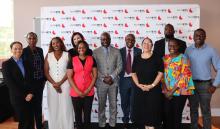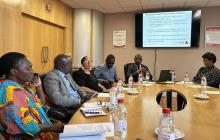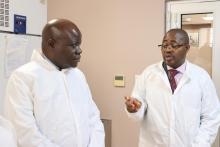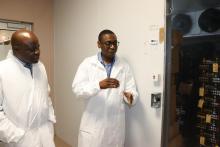Strengthening collaboration for safer blood and availability
Windhoek—The World Health Organization (WHO) visited the Namibia Blood Transfusion Service (NamBTS) Headquarters in Windhoek to gain an in-depth understanding of the organization’s operations and identify potential areas for closer collaboration. The visit, initiated by NamBTS, provided WHO an opportunity to observe the entire blood donation and transfusion value chain, from donor recruitment and collection to testing, processing and safe patient transfusion. Discussions highlighted NamBTS’s rigorous quality assurance systems that ensure the safety, efficacy, and consistent availability of blood products nationwide.
NamBTS, licensed by the Ministry of Health and Social Services (MoHSS), operates as the sole entity mandated to collect, test, process, and distribute blood and blood components to hospitals across Namibia. The service sources all blood from voluntary, non-remunerated blood donors and maintains strict standards in donor screening, laboratory testing and compatibility verification to guarantee patient safety.
According to Mr. Israel Chipare, Chief Executive Officer of NamBTS, the organization operates its head office in Windhoek, supported by six regional branches. Testing, processing and distribution activities are centralized in Windhoek, complemented by five blood banks and five fixed donation centers, as well as more than 300 mobile donation clinics countrywide. “In the 2025 financial year, NamBTS collected more than 50,000 units of blood, 85% of which came from repeat donors,” said Mr. Chipare. “With more than 30,000 registered blood donors, representing approximately 1.1% of Namibia’s population, NamBTS continues to uphold a strong culture of voluntary blood donation,” he noted. NamBTS also extends its impact beyond Namibia’s borders through the export of surplus plasma to the National Bioproducts Institute (NBI) in South Africa. At NBI, the plasma undergoes fractionation to produce plasma-derived medicinal products (PDMPs) such as immunoglobulins, clotting factors and albumin. These products are approved by the National Regulatory Authorities of Botswana, Namibia, South Africa and Mauritius for the treatment of various medical conditions, thereby contributing to regional self-sufficiency in lifesaving therapies.
During the visit, the WHO commended NamBTS for its leadership in maintaining high-quality standards and innovative practices. “We are especially impressed by the robust systems, innovative approaches and continuous quality improvement efforts that position NamBTS as a model for the region,” said Dr. Richard Banda, WHO Representative to Namibia. He further emphasized WHO’s commitment to continued collaboration. “We look forward to documenting and sharing NamBTS’s best practices so that other countries may benefit from its experience and leadership in strengthening national blood services,” he added. “WHO remains committed to working with NamBTS to advance national and regional goals for blood safety and availability,”.
The visit reaffirmed the strong partnership between WHO and NamBTS in ensuring the availability of safe, sufficient, and accessible blood for all patients in need across Namibia.







